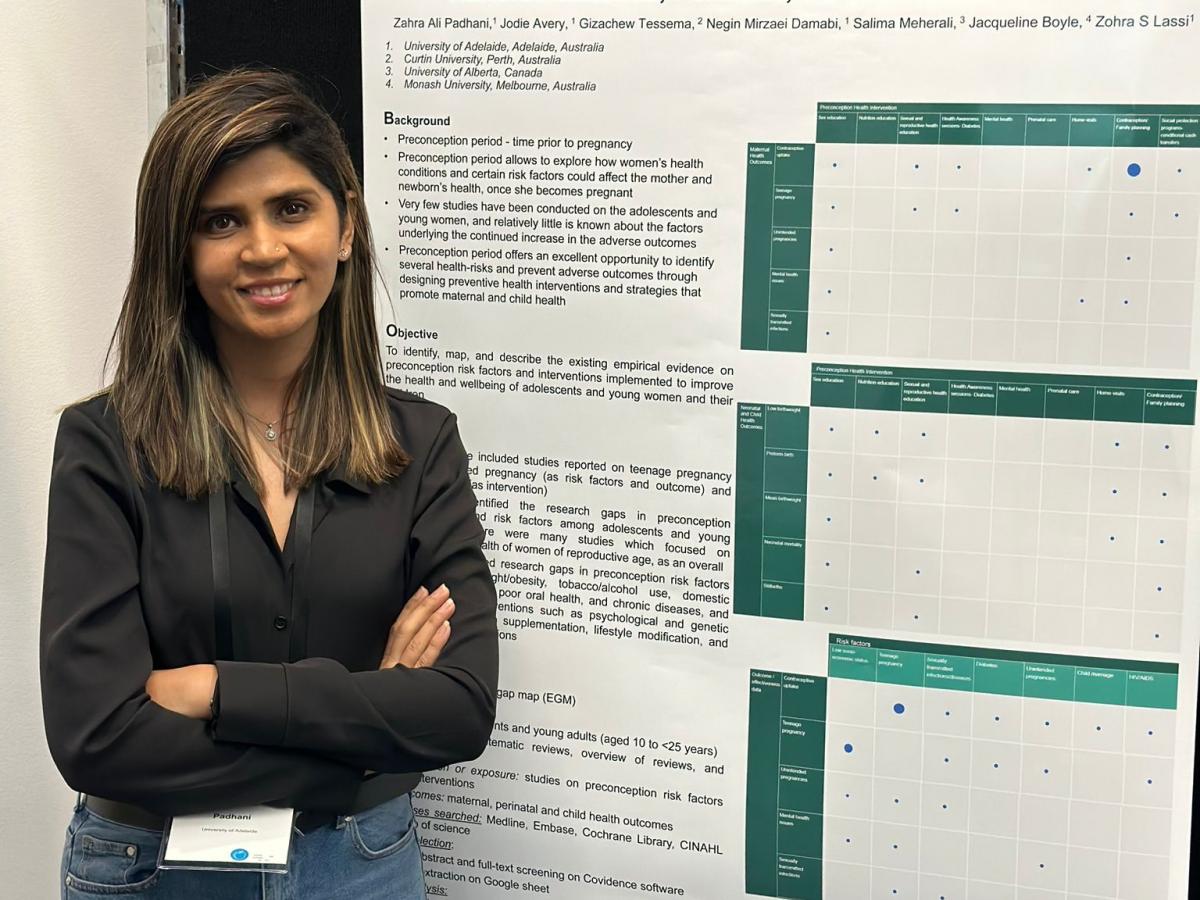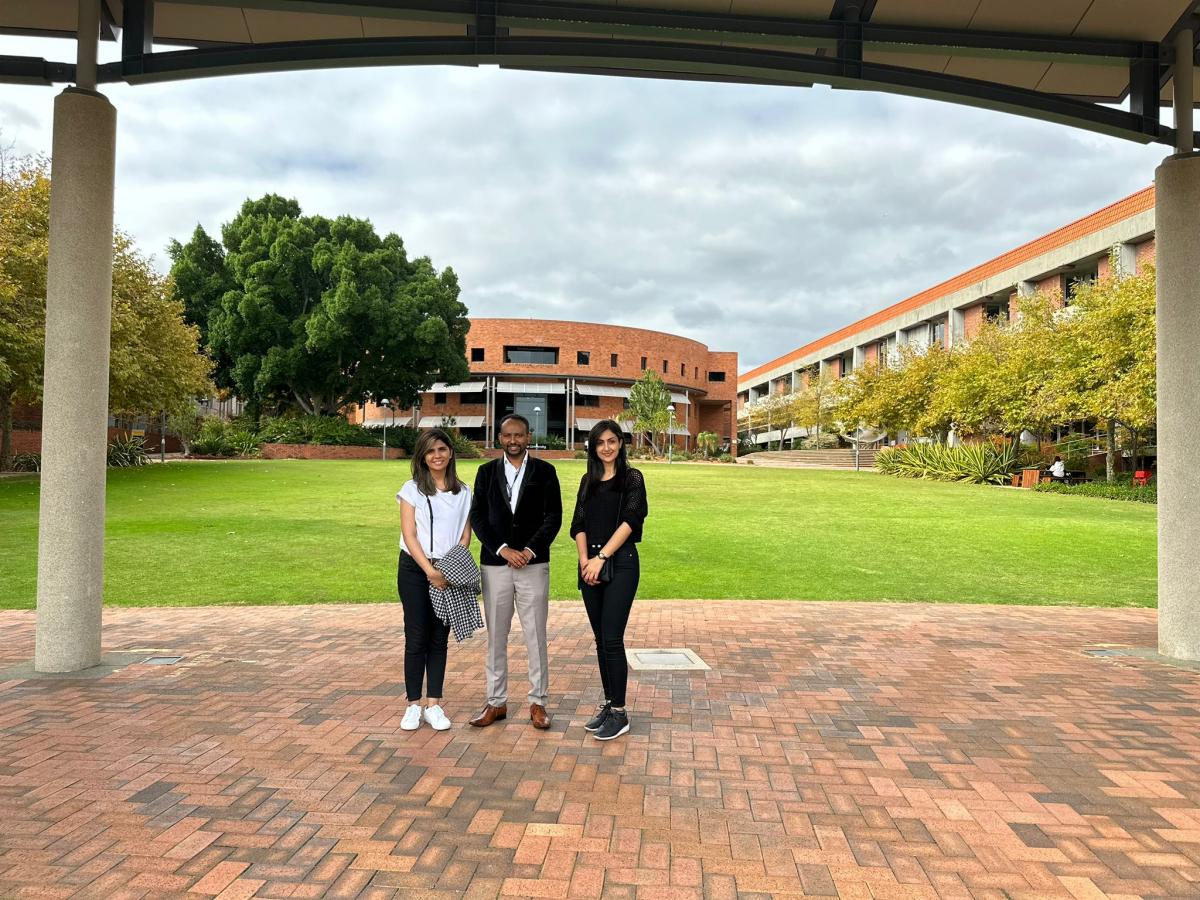Travel story: Zahra Ali Padhani
Zahra Padhani from the Robinson Research Institute travelled to Perth to attend the Science on the Swan Conference in May.
What was a highlight of the travel?
The highlight of my travel was attending the SWAN conference, where I had the opportunity to present my poster in front of researchers and health professionals from diverse backgrounds. It was an exciting experience to share my research findings and engage in discussions with experts in the field.
What fascinated me the most was the genuine interest shown by young researchers who approached me to discuss my research. They expressed their concerns about the potential risk factors that could impact their own pregnancies, highlighting the relevance and importance of my work. It was inspiring to connect with fellow researchers who shared similar interests and aspirations.
Moreover, the conference provided a platform for interdisciplinary discussions. Health professionals from various research areas, such as mental health, recognized the gaps in their own domains after reviewing the findings from my evidence gap map. This led to fruitful conversations on potential collaborations and addressing the mental health needs of adolescents and young people.
Overall, the opportunity to present my poster, engage with fellow researchers, and witness the practical implications of my research in different fields was the true highlight of my travel. It reaffirmed the significance of my work and inspired me to continue making valuable contributions to the scientific community.
How will the experience support you and your research going forward?
Attending the SWAN conference and presenting my research will significantly support my future work. Valuable feedback received from experts will enhance the quality and impact of my research. Connections made during the conference may lead to collaborations, expanding the scope of my work. Staying updated with the latest advancements will inspire new research directions. Presenting to a wider audience increases visibility and potential partnerships. Overall, the experience gained from the conference will strengthen my research, foster collaborations, inspire innovation, and enhance the visibility of my work.
What was the most exciting thing you learned/experienced as part of your travel?
The most exciting thing I learned/experienced during my travel was the opportunity to have my first poster presentation after moving from Pakistan. It was a completely new experience for me, stepping into the world of academic conferences and sharing my research on an international platform. Presenting my work to a diverse audience allowed me to gain valuable insights, receive feedback, and broaden my perspective on research practices and trends. The experience of showcasing my research in a global setting was both thrilling and rewarding, as it marked a significant milestone in my academic journey and demonstrated my growth as a researcher. It instilled in me a sense of confidence and excitement for future opportunities to disseminate my work and engage with the global scientific community.
Please provide details on any researchers or collaborators of significance that you met at the conference and why they are important to your work?
Meeting the team members of Dr. Romola Bucks, who are actively involved in the Raine Study, was a significant collaboration for my research. Their ongoing work involves collecting cohort data from multiple generations (Gen 0, Gen 1, Gen 2, and Gen 3) across pregnancy, childhood, adolescence, and early adulthood. This collaboration is important to my research as it aligns with the fourth objective of my PhD thesis, in I aim to use the ALSWH data to look at the impact of preconception health risk factors among adolescents and its impact on maternal, perinatal and child health outcome. Their expertise in longitudinal cohort studies and access to comprehensive data from the Raine Study enhances the quality and depth of my research, providing valuable insights and potential interdisciplinary collaborations.
List labs or research facilities you visited. Please provide a brief summary including how these visits will be useful to your work and/or career development?
During my travel to Perth, I visited Curtin University to meet with my co-supervisor, Dr. Gizachew Tessema. During this visit, we discussed on the research conducted by my fellow PhD colleague. This exchange of information and insights provided me with a broader perspective on related research areas and potential collaborations within the university. We also discussed on the progress of my current research work and explore future implications for my research. Dr. Tessema, oriented us about the work done by Curtin University and kindly gave us a tour of the University. The visit to Curtin University offered me the opportunity to familiarize myself with the work being done at the institution.
What was the most interesting or unexpected moment of your travel?
During my travel to Perth, my fellow PhD student and I encountered a rather unexpected and intriguing moment. The day we landed in Perth, we were unfortunate victims of a car break-in. To our dismay, they made away with our laptop bags, which not only contained our personal belongings but also our university-issued laptops. It was an incredibly disheartening experience, especially considering it occurred on our very first day.
However, despite the initial shock and distress, I was genuinely impressed by the level of support and assistance provided by the university staff. They promptly helped us initiate the insurance claim process, ensuring that we would be compensated for our losses. Moreover, they went above and beyond by arranging for replacement laptops upon our return, alleviating some of the inconvenience and ensuring we could resume our academic activities without further delay.


